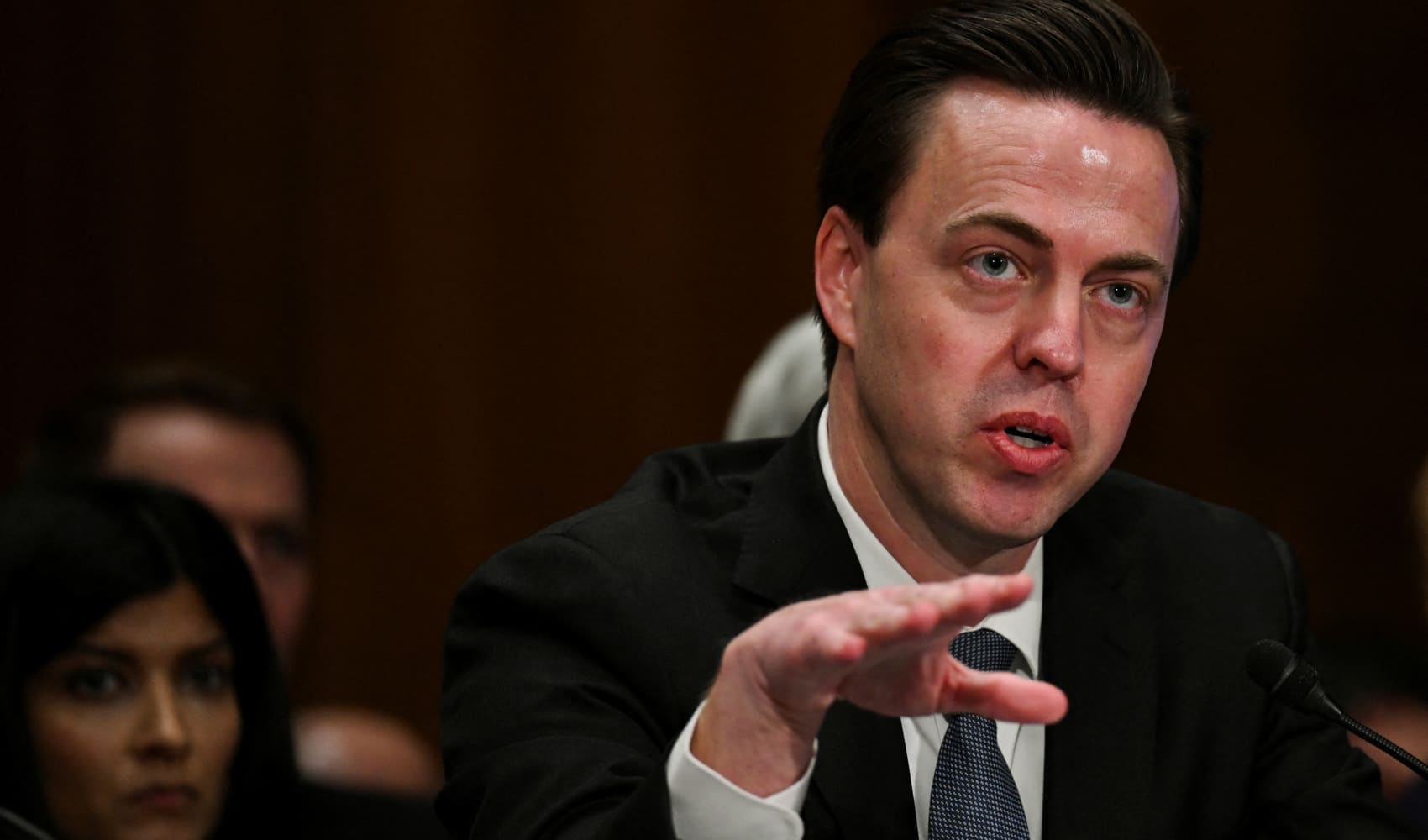McKernan's Move: Trump Taps CFPB Nominee for Treasury Post!
Trump's Treasury Shakeup: McKernan Nominated for Top Finance Post!
Introduction: A Double Nomination?
What happens when you're nominated for one high-profile position, only to potentially be tapped for another, seemingly even bigger one? Well, that's the situation Jonathan McKernan finds himself in. President Donald Trump intends to nominate McKernan to be the undersecretary of domestic finance at the Treasury Department, a significant move that comes months after his initial nomination to lead the Consumer Financial Protection Bureau (CFPB).
McKernan's CFPB Nomination: Still on the Table?
The million-dollar question is: what becomes of the CFPB nomination? The official statement from the Treasury Department is, shall we say, a little ambiguous. It acknowledges that McKernan "has been an advisor at the Treasury Department while awaiting Senate confirmation to lead the Bureau of Consumer Financial Protection," but it stops short of explicitly stating that the CFPB nomination has been withdrawn. It's like a cliffhanger in a political thriller!
The Undersecretary of Domestic Finance: A Crucial Role
What Does the Undersecretary Do?
So, what *does* an undersecretary of domestic finance actually do? It's a crucial position, acting as a key advisor to the Treasury Secretary on matters related to the U.S. economy. Think of them as a financial quarterback, coordinating strategies and policies that impact everything from lending to tax policy.
Why is This Position Important?
This role has immense influence on shaping economic policies within the U.S. The decisions made by the Undersecretary can affect everyday Americans. We're talking mortgages, student loans, and even the strength of the dollar. No small potatoes, folks!
Jonathan McKernan: Who is He?
Before we dive deeper, let's get to know Jonathan McKernan a little better. While information about his background leading up to his advisory role at the Treasury Department is limited in this context, the implication is that he has financial expertise that President Trump finds valuable. It's crucial to understand his previous experience to gauge his potential impact on domestic finance.
The CFPB: A Contentious Agency
Understanding the CFPB's Mission
The Consumer Financial Protection Bureau (CFPB) is an agency created in the wake of the 2008 financial crisis to protect consumers from predatory financial practices. Think of them as the financial watchdogs, keeping an eye on banks, lenders, and other financial institutions.
Why the CFPB is "Embattled"
The term "embattled" is often used to describe the CFPB because it's been a frequent target of political controversy. Some argue that it overregulates the financial industry, hindering economic growth. Others believe it's a vital safeguard for consumers, preventing another financial meltdown. The truth probably lies somewhere in the middle, doesn't it?
Potential Implications of the Nomination
Shifting Priorities?
Does this new nomination signal a shift in priorities for the Trump administration? Maybe. Perhaps the administration sees McKernan as better suited for a broader role in shaping domestic finance policy than solely focusing on consumer protection. It's a bit like taking a star player off the defensive line and putting them in the offensive backfield.
Impact on Financial Markets
Any change at the Treasury Department can send ripples through the financial markets. Investors and economists will be closely watching to see how McKernan's appointment might affect interest rates, lending practices, and overall economic stability. The markets hate uncertainty, so clarity will be key.
The Senate Confirmation Process
What to Expect
Even with President Trump's nomination, McKernan isn't guaranteed the job. He'll have to go through the Senate confirmation process, which can be a long and arduous journey. Think of it as an obstacle course filled with tough questions and political maneuvering.
Potential Roadblocks
Opposition from Democrats (and possibly some Republicans) is possible, especially given the CFPB controversy. Senators may grill McKernan on his views on financial regulation, consumer protection, and the role of government in the economy. He'll need to be prepared to answer some tough questions!
The Treasury Department: A Powerful Institution
Its Role in the U.S. Economy
The Treasury Department is one of the most powerful institutions in the U.S. government. It's responsible for managing the nation's finances, collecting taxes, paying bills, and overseeing the financial system. It's the financial engine of the country.
Key Responsibilities
Beyond the basics, the Treasury Department also plays a crucial role in international finance, working with other countries to promote economic stability and combat financial crime. It's a complex and multifaceted agency with a global reach.
McKernan's Potential Vision
What Could His Priorities Be?
While it's difficult to say definitively what McKernan's vision for domestic finance would be, we can speculate based on his previous experience and the general policies of the Trump administration. Expect an emphasis on deregulation, tax cuts, and promoting economic growth.
Possible Challenges Ahead
McKernan would face numerous challenges as Undersecretary, including navigating a complex global economy, managing the national debt, and addressing income inequality. It's a demanding job that requires a sharp mind and a steady hand.
The Political Landscape
The Impact of the Nomination on the Midterm Elections
Political appointments always have a political dimension. This nomination could energize Trump's base while further alienating Democrats. It's a delicate balancing act.
A Test of Bipartisanship?
Will this nomination be another partisan battle, or will it offer an opportunity for bipartisan cooperation? It remains to be seen. But given the current political climate, expect a fair amount of debate and disagreement.
Looking Ahead: What Happens Next?
The Senate Confirmation Hearing
The next step is the Senate confirmation hearing. This is where McKernan will face questions from senators and have the opportunity to present his vision for domestic finance. Pay close attention to this hearing; it will provide valuable insights into his policy priorities.
The Final Vote
After the hearing, the Senate will vote on McKernan's nomination. If confirmed, he'll officially become the Undersecretary of Domestic Finance. If not, President Trump will have to nominate someone else. The political drama continues!
Conclusion: A New Chapter for Treasury?
The potential appointment of Jonathan McKernan to the Undersecretary of Domestic Finance position at the Treasury Department represents a significant development in the Trump administration's economic policy team. While questions remain about the status of his CFPB nomination, this move suggests a possible shift in priorities. Ultimately, the Senate confirmation process will determine whether McKernan takes on this influential role and what impact his policies might have on the U.S. economy.
Frequently Asked Questions (FAQs)
Q: What are the primary responsibilities of the Undersecretary of Domestic Finance?
A: The Undersecretary acts as a key advisor to the Treasury Secretary on matters related to the U.S. economy, including financial regulation, lending policy, and tax reform. They help shape the government's overall economic strategy.
Q: What is the Consumer Financial Protection Bureau (CFPB)?
A: The CFPB is a government agency created to protect consumers from unfair, deceptive, or abusive practices in the financial marketplace. It oversees banks, lenders, and other financial institutions.
Q: Why is McKernan's nomination considered controversial?
A: The controversy stems from the contentious nature of the CFPB and differing opinions on the appropriate level of financial regulation. Some see the CFPB as overreaching, while others believe it's a vital consumer protection agency.
Q: What factors will the Senate consider during McKernan's confirmation hearing?
A: Senators will likely question McKernan on his views on financial regulation, consumer protection, and his overall economic philosophy. They'll also scrutinize his past experience and qualifications for the role.
Q: How could McKernan's appointment affect everyday Americans?
A: As Undersecretary, McKernan's decisions could impact various aspects of personal finance, including mortgage rates, student loans, credit card policies, and access to credit. These policies can have a direct impact on household budgets and financial well-being.

